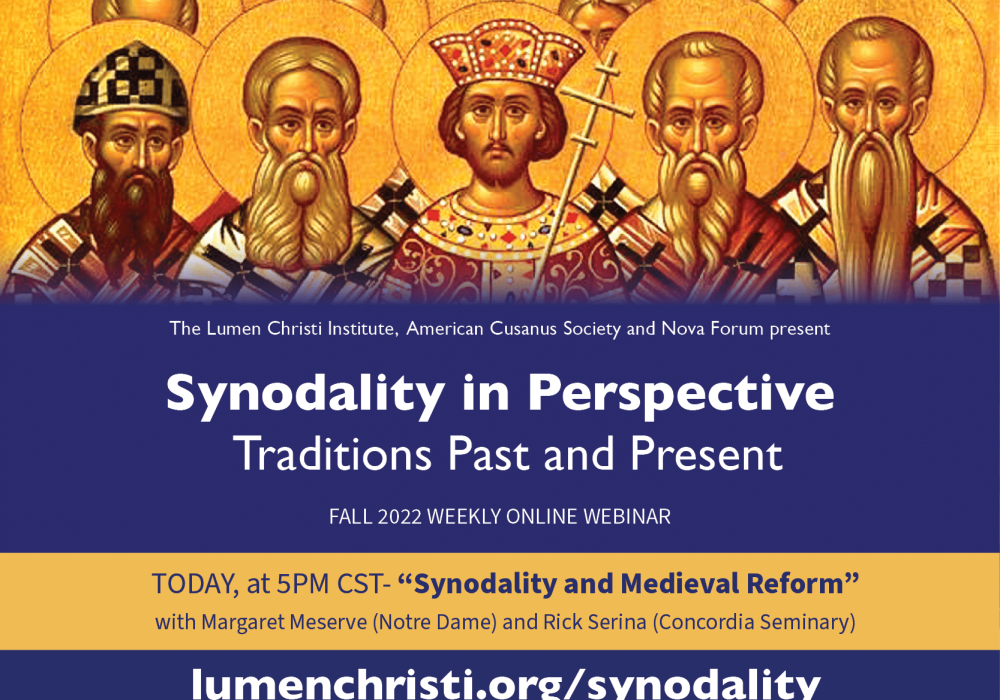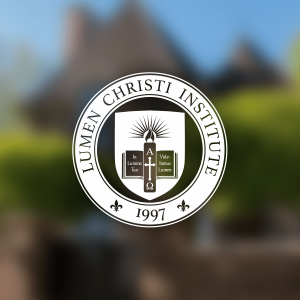Free and open to the public. This online symposium series is being organized by the American Cusanus Society, Nova Forum and the Lumen Christi Institute. Additional Cosponsors include Commonweal, Harvard Catholic Forum, America Media, the St. Anselm Institute for Catholic Thought and the Collegium Institute.
About the Series | In light of Pope Francis’ call for global Catholic communities to enter into a two-year process on synodality, this six-part series will examine both the history of synods and the current dialogue around the future of synodality in the Church. This series is an opportunity to learn more about the topic in advance of the October 2023 Rome summit, “For a Synodal Church.” Pope Francis is inviting the entire Church to reflect on “this path of synodality which God expects of the Church of the third millennium,” an important part of the Church’s own process to achieving participation and living out mission.
About Session 1 | A dialogue exploring the connection between conciliarism and synodality cum et sub petro, featuring Margaret Meserve (Notre Dame) and Rick Serina (Concordia Seminary), moderated by Christopher Bellitto (Kean University).
Moderator: Christopher Bellitto, Kean University
-
Margaret Meserve, Notre Dame
-
Rick Serina, Concordia Seminary
Reverend Dr. Richard J. Serina, Jr. is associate executive director for the Commission on Theology and Church Relations of the Lutheran Church Missouri Synod and teaches at Concordia Seminary in St. Louis, MO. He wrote his dissertation on Nicholas of Cusa’s concepts of ecclesiology and reform, published with EJ Brill in 2016 as Nicholas of Cusa’s Brixen Sermons and Late Medieval Church Reform. He has edited books on Lutheran ecclesiology and Luther’s debate at Leipzig in 1519, and has written numerous essays on ecclesiology and reform in the late Middle Ages and Reformation, including “Irreparable Breach or Late-Medieval Reform? Luther’s Address to the Christian Nobility and the Conciliar Reform Tradition,” which won the 2020 Douglas Murray Prize from Renaissance & Reformation Review.
Margaret Meserve is Glynn Family Honors Collegiate Professor of History and Director of the Glynn Family Honors Program at the University of Notre Dame. She is a scholar of the Italian Renaissance with a special interest in the history of the papacy. She is the author of Papal Bull: Print, Politics, and Propaganda in Renaissance Rome (Johns Hopkins, 2021), which examines how the papacy adopted printing to broadcast news, information, propaganda, and disinformation in Rome in the first decades after Gutenberg. The book was “highly commended” for the DeLong Book History Prize by the Society for the History of Authorship, Reading, and Publishing. Meserve has published several other books including a multivolume translation of the autobiographical Commentaries of the Renaissance Pope Pius II. Meserve has won support for her work from the National Endowment for the Humanities, the American Council of Learned Societies, and the Newberry Library in Chicago. She is also a Fellow of the American Academy in Rome.
Christopher Bellitto is Professor of History at Kean University in New Jersey, where he teaches courses in ancient and medieval history. A specialist in the Middle Ages, church history and reform, he is the author of ten books and over 30 articles and book chapters published in the United States and Europe, He has twice won grants from the National Endowment for the Humanities. In Summer 2019, he was a Fulbright Specialist at the University of Canterbury in Christchurch, New Zealand, and was Visiting Scholar at Princeton Theological Seminary 2021-2022. Dr. Bellitto also serves as series Editor in Chief of Brill’s Companions to the Christian Tradition and Academic Editor at Large for Paulist Press. He offers about 30 public lectures each year; is a member of the Public Scholar Speakers Bureau of the NJ Council for the Humanities, and has taped audio courses for Now You Know Media/Learn 25. A media commentator on church history and contemporary Catholicism, he appears frequently in print, on radio, and television.


